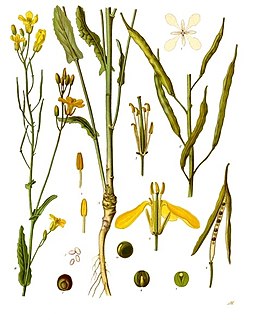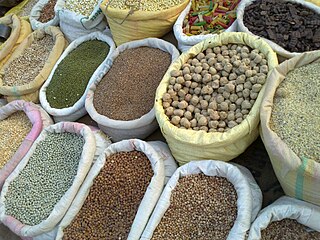Related Research Articles

An annual plant is a plant that completes its life cycle, from germination to the production of seeds, within one year, and then dies. Summer annuals germinate during spring or early summer and mature by autumn of the same year. Winter annuals germinate during the autumn and mature during the spring or summer of the following calendar year.

Sesame is a flowering plant in the genus Sesamum, also called benne. Numerous wild relatives occur in Africa and a smaller number in India. It is widely naturalized in tropical regions around the world and is cultivated for its edible seeds, which grow in pods or "buns". World production in 2016 was 6.1 million tonnes, with Tanzania, Myanmar, India, and Sudan as the largest producers.

Vegetable oils, or vegetable fats, are fats extracted from seeds, or less often, from other parts of fruits. Like animal fats, vegetable fats are mixtures of triglycerides. Soybean oil, rapeseed oil, and cocoa butter are examples of fats from seeds. Olive oil, palm oil, and rice bran oil are example of fats from other parts of fruits. In common usage, vegetable oil may refer exclusively to vegetable fats which are liquid at room temperature.

Rapeseed, also known as rape, oilseed rape, and, in the case of one particular group of cultivars, canola, is a bright-yellow flowering member of the family Brassicaceae, cultivated mainly for its oil-rich seed. It is the third-largest source of vegetable oil and second-largest source of protein meal in the world.

Brassica rapa is a plant consisting of various widely cultivated subspecies including the turnip ; napa cabbage, bomdong, bok choy, and cime di rapa ; and Brassica rapa subsp. oleifera, an oilseed which has many common names, including turnip rape, field mustard, bird rape, and keblock.

Camelina sativa is a flowering plant in the family Brassicaceae and is usually known in English as camelina, gold-of-pleasure, or false flax, also occasionally wild flax, linseed dodder, German sesame, and Siberian oilseed. It is native to Europe and to Central Asian areas. This plant is cultivated as oilseed crop mainly in Europe and in North America.

Lepidium campestre, the field pepperwort or field pepperweed or field cress, is usually a biennial with some form of annual plant in the Brassicaceae or mustard family, native to Europe, but commonly found in North America as an invasive weed. The most notable characteristic of field pepperweed is the raceme of flowers which forks off of the stem. These racemes are made up of first small white flowers and later green, flat and oval seedpods each about 6 mm long and 4 mm wide. Each seedpod contains two brown, 2.5 mm long seeds.

Agriculture is one of the bases of Argentina's economy.
Plant breeding in Nepal is the art and science of improving the heredity of plants for benefit of humanity in Nepal. The major crops of Nepal include rice, wheat, maize, oil seeds and grain legumes.

Agriculture in Ethiopia is the foundation of the country's economy, accounting for half of gross domestic product (GDP), 83.9% of exports, and 80% of total employment.
The economy of Saskatchewan has been associated with agriculture resulting in the moniker "Bread Basket of Canada" and Bread Basket of the World. According to the Government of Saskatchewan, approximately 95% of all items produced in Saskatchewan, depend on the basic resources available within the province. Various grains, livestock, oil and gas, potash, uranium, wood and their spin off industries fuel the economy.
In United States agricultural policy, other oilseed is defined in the 2002 farm bill as:
BOCM Pauls Limited was a British animal feed company, established in 1992 by the amalgamation of two existing businesses.
The Agriculture and Horticulture Development Board (AHDB) is a levy board funded by farmers and growers and some other parts of the supply chain. It plays a vital role in improving farm business efficiency and competitiveness in the areas of: pigs, beef and lamb production in England; milk, potatoes and horticulture in Great Britain; and cereals and oilseeds in the UK. It undertakes research and development and farm-level knowledge transfer activity, provides essential market information to improve supply chain transparency and undertakes marketing promotion activities to help stimulate demand and to develop export markets. These are activities which most individual farm businesses could not afford to do themselves.

A grain is a small, hard, dry seed, with or without an attached hull or fruit layer, harvested for human or animal consumption. A grain crop is a grain-producing plant. The two main types of commercial grain crops are cereals and legumes.

In agriculture, shattering is the dispersal of a crop's seeds upon their becoming ripe. From an agricultural perspective this is generally an undesirable process, and in the history of crop domestication several important advances have involved a mutation in a crop plant that reduced shattering — instead of the seeds being dispersed as soon as they were ripe, the mutant plants retained the seeds for longer, which made harvesting much more effective.
An oilseed press is a machine that lies at the center of vegetable oil extraction. This is due to the fact that this technology is designed to release oil from oilseeds. Multiple oilseed press layouts have been developed over time to complete this process, with each having its own distinct set of advantages and disadvantages. Moreover, the products that are created by oilseed presses, namely oil and oilseed meal, possess great nutritive benefits for humans and livestock respectively. The oilseed press, being at the center of the oil-extraction process, is joined with various other pieces of equipment and procedures that form a pre- and post-extraction system.

Kodeboyina Sivannarayana Varaprasad is an Indian agricultural scientist, Nematologist and the Director of Indian Institute of Oilseeds Research, Rajendranagar, Hyderabad. He was former Head of NBPGR, Regional Station at Hyderabad for about a period of 26 years. and was associated in the development of 11 genetic stocks in tomato, linseed, jatropha, cowpea, chilli and sorghum. Dr.K.S.Varaprasad is recipient of Late Sri P.P. Singhal Memorial Award, 2015.

Cannabis in Russia is illegal. Possession of up to 6 grams is an administrative offense, punishable by a fine or detention of 15 days. Possession of larger amounts is a criminal offense.
Australian wheatbelts comprise inland agricultural regions across southern and eastern Australia.
References


The Congressional Research Service (CRS), known as Congress's think tank, is a public policy research arm of the United States Congress. As a legislative branch agency within the Library of Congress, CRS works primarily and directly for Members of Congress, their Committees and staff on a confidential, nonpartisan basis.